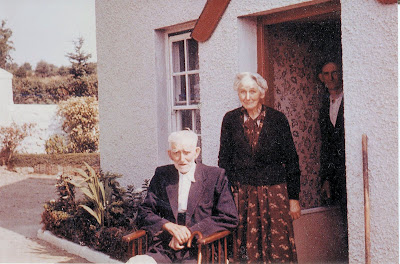Notre Dame de Lamerci has a large main church, which seats about 300. But today, for this special feast day, Mass would be celebrated at one of the seven chapels that are part of the parish. Father Andre goes to each chapel three or four times a year to say Mass. It is a big deal. Last evening, Father traveled to the chapel area to hear people’s confession as they prepared for the Mass.
“They don’t have a chapel--a building,” explained Father Andre. “But they will make one out of blankets and sheets.” On the morning of the Mass, a white pick up truck made a couple of trips to the site, transporting the alter and some drums. And then we jumped in and made the 10 minute drive.
We arrived about an hour after Mass was supposed to begin. Of course, Mass can’t begin without Father and he, along with us, was waiting for Tamara and Pamela, nurses who were taking care of a sick child who had showed up at the clinic with her mother. But Haitians aren’t as particular as Americans about timeliness; they were cheerfully saying the rosary when we arrived.
The Haitians had indeed used sheets, canvas, and big sticks to construct their chapel. Inside, blue and white paper chains and blue flowers and ribbons festooned the walls. A sea of white hair bows floated above the lovely heads of the many Haitian girls who sat patiently on the benches.
Mass was two hours. This is a shock to American Catholics who get antsy at home when the Liturgy approaches an hour. But the Haitian girls gave glory to God with their dancing and the choir and congregation lifted their voices and music in beautiful praises. One of the bongo drums looked as if it was made from a tree trunk.
Father welcomed us and told the congregation that he was offering the Mass for my brother Father Jim, whose birthday is today.
At the end, speakers made many important announcements, Tamara, our nurse, talked about what to do if you get an open wound. After Mass was over, the people of the parish fed the children a meal.
In the afternoon, we went to a monthly meeting of pregnant women that was scheduled around our visit. Father is giving us much credit for contributing to his recently built maternity hospital. Besides this, having a meeting of pregnant women on the day that the Catholic church celebrates the conception of a baby seems appropriate.
About 25 pregnant women, most of whom looked to be in their second trimester or later arrive for the meeting. There is also a row of quite elderly people. We couldn’t figure out why they were present.
Tamara talked with the women about how it important it is to have everything clean if they deliver the baby at home. Some of the women asked questions. Then the nurses distributed a sandwich and soda to the women and a bag of rice to take home. These perks ensure good attendance at the meeting.
During the food distribution, we found out that the older people present were midwives.






























